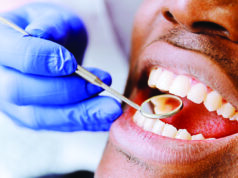By Beatrice Nakibuuka
The ability to have an erection and sustain it for two-to-35 minutes is what qualifies a man as having a normal sexual function.
Beyond this time, a man suffers from a condition known as anorgasmia or delayed ejaculation.
But if he gets an erection, but is unable to sustain it for two minutes, then he is said to have premature ejaculation.
This often causes sexual dissatisfaction, especially to the woman married to such a man. However, it is not an erectile dysfunction.
Erectile dysfunction is the inability of a man to attain or maintain an erection. According to Dr Godfrey Nabunwa, a urological surgeon at Rubaga Hospital, Kampala, there are three types of erections: a nocturnal erection which happens when a man is unaware, mostly at night and usually extending to morning hours, reflexogenic erection which happens after a physical contact with a woman, and psychogenic which occurs after imagination that brings arousal.
Dr Nabunwa notes that sex is a very important factor in any marriage, with the brain being a key player for it to happen.
An increase in blood flow to the penis causes an erection. But after ejaculation, the blood is pushed back.
“Stimulation starts in the brain and this is then turned into desire. There should be an intact nervous flow from the brain, enough supply of hormones, good blood flow and a mechanism that maintains the blood there until an orgasm happens,” Dr Nabunwa says.

The causes
Male sexual arousal involves the brain, hormones, emotions, nerves, muscles and blood vessels.
Erectile dysfunction can result from a problem with any of these. More so, stress and mental health concerns can cause or worsen erectile dysfunction.
A combination of physical and psychological issues cause erectile dysfunction.
A physical condition that slows a man’s sexual response might cause anxiety about maintaining an erection.
The resultant anxiety can lead to or worsen the state of one’s erectile dysfunction.
Aging is one of the biggest causes of erectile dysfunction. Most body functions reduce with age and so does sexual function.
This is because with age, the male sex hormone (testosterone) also reduces. This explains why men’s sexual function reduces with age.
Dr Nabunwa says anything that affects blood vessels and its flow can affect male sexual function.
These include heart disease, diabetes, high blood pressure, high cholesterol levels, obesity, smoking, and excessive consumption of alcohol which damages hormonal profile and the liver.
Anything that affects the brain also affects the sexual performance of a man.
Depression, anxiety, stress, relationship problems, lack of self-care and change in body shape can demotivate a man and affect his libido.
“Most of the time, erectile dysfunction can be a warning sign for mental health problems in men. It is also important that couples maintain their body shapes because any changes can greatly demotivate a man, causing him to fail to function sexually,” Dr Nabunwa says.
Other causes can include a sedentary lifestyle (no exercise), some medical procedures such as prostate surgery or radiation treatment for cancer, surgeries and trauma to the external genitalia, causing injuries that damage the nerves or arteries that control erections.

Symptoms
The commonest symptoms of male sexual dysfunctions include persistent trouble getting an erection, trouble maintaining an erection, and reduced desire for sex.
If you have any concerns about sexual problems such as premature ejaculation or erectile dysfunction, it is important to seek medical help because if these conditions are left unattended to, one could develop complications such as anxiety and stress, violence, embarrassment and low self-esteem, unsatisfactory sex life, relationship problems and inability to get a partner pregnant.
Prevention/ management
In order to manage male sexual dysfunction, it is important that one gets treated for the underlying cause(s).
Nabunwa says: “Men with such problems should have their diabetes, blood pressure, cholesterol levels and alcohol consumption level controlled.
“In many cases, when these problems are addressed, many men return to normal and their sexual life is improved.”
He also advises people to seek counseling and medical help as a couple such that what the man cannot explain to the wife, the doctor or counselor will be able to explain.
“The challenge sometimes is that some couples have very abnormal expectations in relationships. If a man can have an erection for more than two minutes, it is a normal erection. As a married couple, you should keep it to a minimum.
“It could be a sexual incompatibility challenge that may be due to sexual exposure and experience,” Dr Nabunwa says.
He notes that there is no “Fix it all at once” medicine for male sexual problems.
Erectile dysfunction or premature ejaculation is usually treated as a chronic disease because of the changes in the anatomy of the body.
There is some medication that can be used in the treatment of these dysfunctions, but they can only be given after an assessment from a urologist.
Nabunwa reveals that there are some surgical options that could help treat such conditions, but the challenge is: after the procedure, one does not have the psychological control over sex.
Low testosterone levels
Young adolescents with low male hormone levels experience a delay in the development of the secondary sex characteristics which are meant to start not later than 14 years.
They might not develop pubic hair, deepened voice, and experience reduced growth of the penis and testicles.
If your male child is not showing signs of puberty by the age of 14, you need to seek medical help.
Many men are struggling with symptoms associated with low testosterone levels because of age, injury to testicles or pituitary gland, yet they continue to suffer in silence.
According to Vincent Karuhanga, a general physician at Friends Poly Clinic in Kampala, testosterone is the male sex hormone largely produced in the testicles.
However, it can also be produced in adrenal glands, near the kidneys. This hormone is responsible for determining the male sex characteristics which are also sometimes slightly found in women.
“In men, the hormone causes the voice to deepen, body hair to grow and the genitals to become larger during puberty.
“It is also responsible for sperm production, prominent muscles, maintaining bone density and red blood cell production, affecting sex drive and how the body distributes fat,” Karuhanga says.
Male testosterone levels tend to be highest at around 20 years old, and decline naturally with age.
According to Dr Martin Nsubuga, an endocrinologist at The Surgery Hospital, Naguru, Kampala, from around the age of 25 years, males begin to lose testosterone at about one per cent per year.
This is a slow, but steady drop that can later cause a deficiency of the male hormone. Testosterone levels that are too high or too low can cause various problems.
For instance, too high male hormone levels can trigger early puberty in boys before the age of nine. It is also linked to an increase in the risk of prostate enlargement and cancer.
“Low levels of testosterone in men can cause erection problems, low sex drive, infertility, weakened muscles and bones, body fat gain and hair loss.
Low male hormone levels may result in increased neuro-degeneration and decline in brain function because the male brain highly depends on appropriate levels of testosterone for healthy function,” Nsubuga says.

Management
Karuhanga recommends the testosterone skin gel that is applied to clean, dry intact skin of the upper arm, shoulders, or abdomen once a day, but the amount is prescribed individually depending on the patient.
However, before prescribing this cream, your doctor should be able to warn you about the side effects such as acne, mood changes, headaches, depression, breast enlargement and sometimes shrinking of the testes.
There are also intramuscular testosterone injections administered into the muscles that may be taken every fortnight or after 10 weeks.
One may also be prescribed oral pills containing testosterone. However, if you have prostate cancer or a lump that has not been evaluated, you cannot be put on this therapy.
The best recommendation, according to Karuhanga, is a lifestyle change. This includes a balanced diet plan limiting fats, sugar and salt intake, weight management, and avoiding alcohol and drug use to slow down the decline of testosterone levels.
Causes
Low testosterone is a condition in which the testicles do not produce enough of the male hormone. It is, therefore, important to note that the testes do not suddenly stop producing the male hormone or sperm.
A healthy male is able to make sperm even when they are 80 years or even more. There are several conditions that can cause low testosterone levels.
They include: conditions or injuries that affect your testicles and pituitary gland (also known as hypophysis; a small, pea-sized gland located at the base of your brain).
Congenital abnormalities such as the absence of testicles at birth or testicles that do not descend into the scrotum, removal of the testicles, inflammation of one or both testes, chemotherapy or radiotherapy, tumors, certain medications, and viral diseases during childhood that affect the testes such as mumps.





















